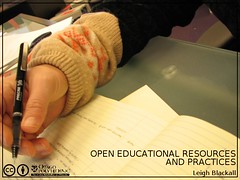Now I have checked out the open education projects suggested.
Warning - Each of them seems to contain a lot of information, modules, functions and so on. Any impressions that I mention here are formed after this first short glimpse of these sites and are not really to be trusted!!
The projects I looked at were OU (UK) Open Content Initiative, MIT OpenCourseWare, Rice Connexions, LeMill.net and Wikiversity. Here are those first impressions!
The projects can be split into two groups. The MIT and OU projects seem to mostly offer ready made educational materials. I felt there was something of a take-it-or-leave-it attitude but the OU does offer a Getting Started section with a very user-friendly area to help you as a student use the materials offered.
Rice Connexions, Le Mill and Wikiversity are all communities where you can both use the material on offer and also contribute to the material – in fact you are strongly encouraged to get started with your contributions! Rice Connexions definitely wins the prize for the easiest site to search for materials! I had problems finding my way around Le Mill, partly because a lot of titles are not in English so you have to open an object to see what it is about. Of course, this disadvantage could well be seen as an advantage if Estonian is your first language.
As I browsed I found that these different projects can be linked together. The Le Mill Atmospheric Processes unit used a module from the OU’s OpenLearn site as reference material.
Another way to divide these projects would be by language. If you need materials in English there is something for you in all of these projects but if you are looking for materials in other languages then the different sites have hugely varying amounts.
Terminology – modules, learning resources, media pieces, collections – each project uses its own terms. In practice I suppose most users stick with one or two projects and quickly learn the associated terminology.
These five projects contain a huge amount of educational material and there are many other projects, including CFL:s own Course hub. Perhaps the next stage is to find a way to search the Internet for OER, or perhaps a specialised search engine already exists. If you know of one please get in touch!
PS I found the photo illustrating this entry by searching for "open educational resource" in Flickr. There were plenty of images to choose from and most of them were free to use under the CC licence!

2 comments:
Hello Keith,
>easiest site to search for materials!
Did you try the search button in Wikiversity (see left navigation bar in Wikiversity)? Did it not bring good/enough results ? Perhaps this page might help: Wikiversity:Searching (there are the go- and search button, last one delivers more results) Besides the search there is also available the major portals where you can dive in.
>that these different projects can be linked together.
as I see this is just a link with a description or ? This is done also e.g. on Wikiversity over "see also" or "external links". E.g. there is also a page like this to foster cooperation with other projects: Educational Wikis. Besides this Wikiversity uses products from other wikimedia projects also, e.g. Wikibooks and Wikipedia.
about languages: all wikimedia projects have several languages - a complete list you can find on meta. Especially for Wikiversity there is a "breeding ground": betawikiversity
btw: to have a new Wikiversity site, you need ten active participants for the project. Then you can request (at meta) for a new language domain to be set up.
about the picture: you know that the creator also has a page at Wikiversity and probably somewhere else also - in case you wanna drop a thank you :-) Perhaps done already on Flickr ?
I tried to read what the person in the pic is writing, but could only identify "Learning". Anyone has better eyes or tools than me ?
Since we have in the course also participants from the other projects hopefully they will also give some more insights.
Erkan YILMAZ
Keith,
One thing I believe about OER based sites is the people who learn the most are the ones who create the content. So MIT and OU offer great reference, the others offer great reference and a deeper learning opportunity. Unless of course you take the MIT or OU course and recreate it under one of the others... ;)
Post a Comment